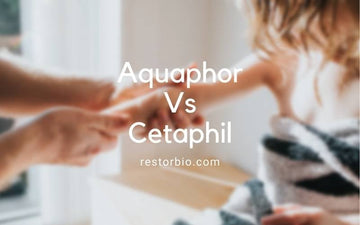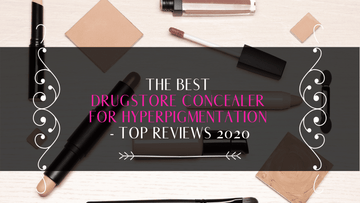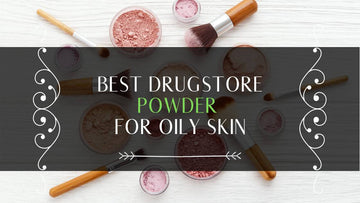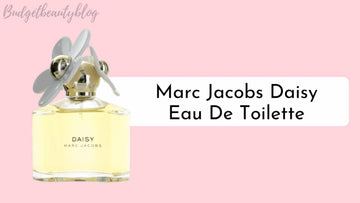
Compare Aquaphor and Cetaphil to see which offers better moisturizing and healing benefits for dry, sensitive skin. Find the perfect choice for your skincare needs.
Today more and more people are considering organic skincare options. Both Aquaphor Vs Cetaphil has been around for some time, but which one is the best? In this article, we will talk about the differences between these two products in terms of ingredients and their results. And help you know which is suitable for your skin.
Both Aquaphor and Cetaphil has great products for skin. Some of them include:
|
Best Aquaphor Vs Cetaphil Products |
Best For |
Type of Products |
|
Damaged Skin |
Skin Ointment |
|
|
Very Sensitive Skin |
Cleansing Wash |
|
|
Cracked Feet |
Foot Mask |
|
|
Oat Extracts |
Body Cream |
|
|
Oily Skin |
Face Wash |
Aquaphor Vs Cetaphil Brands
Both of the brands from Cetaphil cream vs. Aquaphor cream are best at their places. And these products give fierce competition to each other.
These products are conscientious when it comes to the matter of skincare. They are reputed and have been known for years for serving the best products to their customers.

When comparing Cetaphil cream and Aquaphor, there is not much difference between these two products, and last, it would depend totally on your skin type and which moisturizer would work wonders for you.
Cetaphil cream contains glycerine and vitamin E, and it is free from paraben, fragrance-free, sulfate, essential oils, and environmental pollutants. It does have some allergens like farnesol and benzyl alcohol.
This cream is said to hydrate, protect, and prevent the aging of your 20s. The contents of Aquaphor are glycerine, and it is free from paraben, sulfate, silicone, allergen, essential oils, environmental pollutants, and fragrance-free.
This moisturizer protects, hydrates, and gives a soothing effect. The price of these products does vary too much.

Cetaphil Cream Vs Aquaphor: Moisturizing Cream
Cetaphil moisturizing cream treats the skin, which is a very delicate and sensitive skin type. Keeps maintaining the skin hydrated level, which prevents it from irritation and allergy.
The winter season can get on people's nerves with very sensitive skin and dry skin. Cetaphil provides hydration for the skin and makes it healthy, supple, and glowing.
Glycerine is one of the main ingredients in Cetaphil, which is said to be the panacea for all the worries in winter. It is a non-oily lotion that leaves the skin fresh, oil-free, and absorbs into the skin very fast as it is very liquid in texture. Aquaphor enriches dry skin with active ingredients, makes it healthy, and maintains moisture.
It has an ingredient named petrolatum, which locks the water in the skin by making a thin layer of oil, which stops the loss of moisture from the skin.
A good quantity of petrolatum and panthenol helps to keep the skin free from allergy and chapping. You can apply Aquaphor healing ointment to your lips or dry skin in winter.

Aquaphor or Cetaphil for Babies
When it comes to selecting a product for the baby, we consider hundreds of recommendations before using it on the baby's soft skin.
Both of the products have equal scores. Both of these are relevant. There are many high-grade products for the care of babies.
We have one product each from these two products range. Aquaphor Healing Ointment with skin hydrating qualities and makes the baby's skin rash-free.
Cetaphil Baby Daily Lotion has the goodness of vitamin E, sweet almond, sunflower, and natural oils to keep the baby's skin happy and healthy, it is good for dry skin.

Cetaphil Vs Aquaphor for Tattoos
When it comes to tattoos, Cetaphil is recommended amongst Cetaphil vs. Aquaphor. It has a wide range of fragrance-free products free from chemicals and parabens.
That would moisturize the skin deep into the skin and repair it very hastily. It smoothens the skin and makes it rash and irritation-free. This product hydrates the skin and keeps the hydration level maintained. It is a suite for sensitive and dry skin.
Is Aquaphor or Cetaphil better for tattoos?
First off, let's talk about Aquaphor. It's been a staple in many people's tattoo aftercare routine for years. It's thick, odorless, and goes on smoothly. Aquaphor creates a barrier over the tattoo, keeping out dirt and bacteria, while also protecting it from friction. This means the tattoo will heal faster and with less irritation.
However, some people find that it can feel too greasy and hard to absorb into the skin. Plus, if you use too much, it can lead to breakouts and clogged pores. Nobody wants a pimple on their fresh ink. Another downside is that Aquaphor comes in a tube, meaning you have to squeeze it out, which can be a little annoying when you're trying to apply it to a fresh tattoo.
Now, let's turn our attention to Cetaphil. It's a lightweight lotion that's been around for years and is known for its gentle and moisturizing properties. It's also affordable and widely available, making it an accessible option for anyone looking to care for a new tattoo.
Cetaphil provides gentle hydration to the skin and won't clog pores or cause breakouts. It's also a great option for people with sensitive skin. Unlike Aquaphor, Cetaphil comes in a pump bottle, making it easy to apply without having to squeeze anything out.
While it may not provide the same level of protection as Aquaphor, Cetaphil is a solid option if you're looking for something that won't leave a noticeable residue or need to be applied as frequently. Plus, It's also versatile enough to be used as an all-over body lotion, making it a budget-friendly option for anyone on a tight budget.
So, which one should you choose? It ultimately comes down to personal preference. If you're someone who prefers a thicker moisturizer and doesn't mind a little bit of greasiness, Aquaphor might be the better option for you. If you're more on the sensitive side and want something lighter, Cetaphil is a great choice.
What Are the Ingredients in Cetaphil?
The ingredients in Cetaphil are similar to that of other drugstore moisturizers. The first ingredient is petrolatum. This thickener and a long-chain ester give the product its consistency.
The second ingredient is petrolatum again. The third ingredient is caprylate/caprate, a mixture of saturated vegetable fatty acids that serve as emollients.

The fourth ingredient is stearic acid, a mineral-derived fatty acid that acts as a thickener and emulsifier. The fifth ingredient is cetyl alcohol, fatty alcohol that is also used as a thickener and emulsifier.
The last ingredient is polysorbate 20, a preservative that acts as a wetting agent and emulsifier. It helps the product to be less irritating and more stable.
Other ingredients in Cetaphil include blue 1 Lake, green 5, red 27, yellow 6, orange 5, red 33, red 33 lakes, red 30, disodium EDTA, sodium hydroxide, and fragrance.
What Are the Ingredients in Aquaphor?
Aquaphor has a few similar ingredients to Cetaphil. The first ingredient is petrolatum, a thickener and emollient. The second ingredient is caprylate/caprate, a mixture of saturated vegetable fatty acids that serve as emollients.
The third ingredient is stearic acid, a mineral-derived fatty acid that acts as a thickener and emulsifier. The fourth ingredient is cetyl alcohol, fatty alcohol that is also used as a thickener and emulsifier.
The last ingredient is glycerin, a humectant that draws moisture to the skin. Other ingredients in Aquaphor include blue one lake, red 27, yellow 6, orange 5, red 33, disodium EDTA, sodium hydroxide, and fragrance. How do you use Aquaphor?
Aquaphor is generally applied twice a day to freshly cleansed skin as the last step of your skincare routine.
The Differences
Aquaphor healing ointment is a skin conditioner-like product that contains healing ingredients. Aquaphor healing ointment is an excellent skin barrier and moisturizer that has long been used to heal wounds and treat very dry skin conditions such as eczema.
In contrast, Cetaphil moisturizing cream is a gentle cleanser that removes dirt and germs while keeping skin soft and supple.
This Cetaphil moisturizing cream is made with mild surfactants (cleansing agents) that are less likely to irritate the skin than traditional soap, making it suitable for use on even the most sensitive skin and irritated skin areas.
Both Aquaphor and Cetaphil are moisturizers; Aquaphor is more of a healing ointment, and Cetaphil is a lotion. The healing ointment cream is thicker and greasier than a lotion.
This is because the formula contains more oil than water and other ingredients. Because ointments stay on the skin longer than lotions, they are better at locking in moisture.
Mineral oil, lanolin alcohol, ceresin, panthenol, glycerin, petroleum jelly, and bisabolol are the only ingredients in Aquaphor.
Aquaphor is an occlusive moisturizer due to its ingredient list. Occlusive moisturizers create a seal on top of the skin to keep moisture.
Cetaphil moisturizing cream contains water, cetyl alcohol, propylene glycol, sodium lauryl sulfate, and petrolatum as the occlusive component.
In this case, Petrolatum is combined with other ingredients to make it easier to spread across the skin. Dimethicone, stearic acid, methylparaben, and propylparaben are among the other elements in Cetaphil moisturizing cream. These thicken the consistency of the Aquaphor healing ointment.
Aquaphor also contains petroleum jelly, mineral oil and a wax mixture. It forms a protective layer over the skin that helps to keep moisture in. On the other hand, Cetaphil is free of petroleum jelly and mineral oils.
Another distinction between these two products is their price point. According to Amazon prices, Aquaphor is slightly more expensive than Cetaphil.
Conclusion
Aquaphor and Cetaphil are both facial moisturizers designed to hydrate the skin. Aquaphor is made with glycerin and mineral oil, while Cetaphil contains cetyl alcohol, stearyl alcohol, and propylene glycol. Aquaphor is also formulated with petrolatum, while Cetaphil does not include this ingredient.
We hope that our article has helped you better understand the critical differences between Aquaphor and Cetaphil. You now have a more informed choice when purchasing one of these products.




